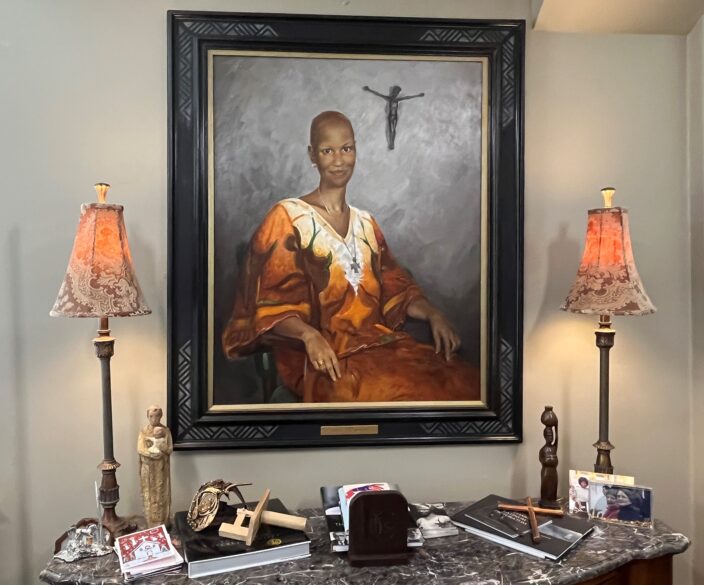From the Archives
By Mary Woodward
As September rolls in upon us and schools are now in full swing, our diocesan director of Catholic Schools, Karla Luke, asked for an update on the canonization process of Sister Thea Bowman, she could share with our Catholic schools. We have a wonderful school in Jackson named after Sister Thea and many students are excited about being associated with someone who is on the official path to sainthood in the church.
Putting someone forward for sainthood is one of the noblest things a diocesan church can do. It involves a very intricate and detailed process of studying the life and acts of that person. Many moving parts make up this initiative and keeping them on track is an adventure.
So, where are we in the canonical process? We are right in the middle of what is called the diocesan phase.

During this phase which has been going on since the cause officially opened in November 2018, the title Servant of God is used when referring to the person. This title is given to those who have been presented and accepted for the canonical process. Therefore, when referring to Sister Thea, her full title now is Servant of God Sister Thea Bowman, FSPA (SOG Sister Thea).
The work being done meticulously right now includes gathering all of the Servant of God’s writings, studying them for sound doctrine, gleaning them for virtue and piety, and transcribing them into type written format. For those who knew the Servant of God, they are fully aware that she would often jot things down on envelopes, napkins, and any scrap of paper she could find. All of these notes have been archived by the Franciscan Sisters in LaCrosse, Wisconsin, where most all of SOG Sister Thea’s papers reside.
Throughout this past summer, an intern has been working in LaCrosse to digitize these writings while many volunteers have been transcribing them to Word documents. All of this is done so that the historical commission can review SOG Sister Thea’s works and develop a report that gives an all-encompassing detail of SOG Sister Thea’s virtuous and pious life.
The historical commission consists of two professors in the field of theology and the archivist for the FSPAs. Technically, they should remain anonymous due to the nature of their work and to avoid any outside influences creating a bias in the process.
Over Labor Day weekend, the historical commission convened in LaCrosse to put eyes on the collection, talk with other FSPA’s who knew the SOG, and create a framework in which to complete their mandate of capturing the SOG’s virtues and documenting all the sources.
In addition to the historical commission, there are two theological censors, also anonymous due to the sensitivity of their work, who examine all of the SOG’s published writings and public statements for orthodoxy to the teachings of the church. These two work independently of each other and submit two separate statements called vota.
On top of the work of the historical commission and the theological censors, we have a scribe, transcribing more than 50 interviews of witnesses who were invited to answer a series of questions about the SOG’s life and virtues – the questionnaire had more than 100 questions, so each interview is rather lengthy.
Finally, once all reports are finished and all writings and interviews transcribed, every single page will be reviewed and given a stamp of approval by the bishop’s delegate and promoter of justice. Then three copies are made of every page for the Dicastery for the Causes of Saints, which are boxed up and sealed then transported to Rome by the postulator, who has been guiding the whole process. A fourth copy is made and sealed to be kept in the diocesan archive vault.
Once all that arrives at the dicastery, the Roman Phase of examination of the cause begins. During this phase, the postulator under the direction of a staff member of the dicastery writes a summary of all the documentation for the dicastery called the “positio.”
This is examined by a panel of theologians who then vote on whether the SOG has lived a heroic life of virtue. If the majority votes in the positive, then the SOG is recommend for review by the Cardinals and Bishops who are members of the dicastery. If after this review the members agree on the virtuous heroicness of the SOG’s life, then the Prefect of the Dicastery recommends to the Holy Father to declare the SOG “Venerable” by means of an official decree from the Holy See.
I know that was a lot to follow but now you can see how ordered and definitive the process really is. It takes time. Our goal is to have the diocesan phase completed by next summer and off to Rome prior to September 2025.
We invite you to pray for the cause, especially for the historical commission, the theological censors, the transcribers, and the postulator as we continue to follow this unique and noble path. And of course, ask SOG Sister Thea to guide us from above with patience and joy.
(Mary Woodward is Chancellor and Archivist for the Diocese of Jackson.)
